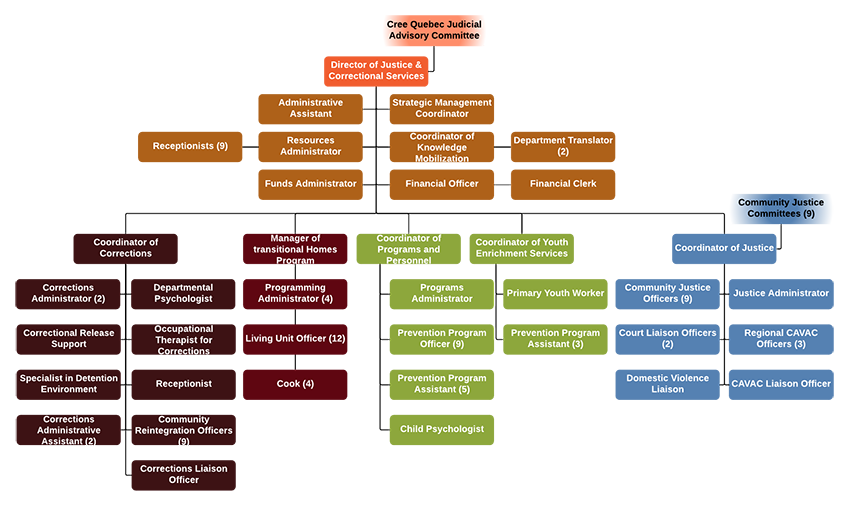
The Department of Justice and Correctional Services (DOJCS) is directed by Donald Nicholls. The DOJCS comprises more than 75 professionals distributed at the head office in Mistissini, in the Val d'Or Regional Office of Correctional Services and in Justice Centres throughout all nine Cree communities.
We are especially proud that the vast majority of our staff are Cree people from Eeyou-Istchee. This ensures we are able to deliver services that are culturally appropriate and in the language of choice of our people.
As important, by attracting, employing, training and mentoring our own people in excellent jobs, we are building essential justice and correctional services capacity that future generations of Cree people will benefit from.


The Team in Detail
The DOJCS organization chart is shown below (click HERE for a PDF larger version).

The following table provides key responsibilities of each position highlighted in the organizational chart:
DOJCS LEADERSHIP
Cree Quebec Judicial Advisory Committee
The Cree Quebec Judicial Advisory Committee is responsible for identifying needs and making recommendations concerning the priorities and strategies relating to the administration of justice for the Crees, including annual budget allocations. Established in 2007, the Committee consists of ten members, five representing the Crees of Eeyou Istchee and five representing the Province of Quebec. The Committee is led by a chairperson, who holds a term of two years. See Leadership for details.
Director of Justice & Correctional Services
The Director of Justice & Correctional Services takes direction from the Director General of the CNG and its senior management committee and receives recommendations from the Cree Quebec Judicial Advisory Committee. He is responsible for the strategic direction and efficient day-to-day operation of the Department. This includes budget setting, establishment of program and service priorities, policies and procedures, liaison with federal and provincial government partners and other CNG departments and entities, human resource management and employee development, among other things.REGIONAL OFFICE OF CORRECTIONAL SERVICES
Cree Coordinator of Corrections
Reporting to the Director of the Department, the Coordinator of Corrections is responsible for overseeing the daily operations of the Correctional Services unit of the DOJCS, including staff management. He/she ensures the delivery of services to Cree detainees in the provincial and federal system and once they are back in the community through rehabilitation and reinsertion programs. He/she liaises with the CNG, communities and other stakeholders for the delivery of culturally sensitive correctional services involving the Crees.
Corrections Administrator
Reporting to the Coordinator of Corrections, the Corrections Administrator is responsible for assisting with the administration of the fund aimed to support projects to rehabilitate and reintegrate Cree offenders. He/she assists the Crees and organisation that apply, answers their questions, communicates guidelines and deadlines, etc. He/she is the first point of contact of recipients of the Fund to help them ensure proper implementation of their project. Furthermore, he/she tracks and reports on projects of the Fund and collaborates with the Coordinator of Corrections to continuously improve its administration, ensuring transparency and accountability.
Community Reintegration Officers (9)
Reporting to the Coordinator of Corrections, the Community Reintegration Officers (CROs) are responsible for the development and administration of community-based reintegration programs. They work in close collaboration with communities, community justice committees, court personnel, police, social service and health care professionals, CAVAC (Centres d'aide aux victimes d'actes criminels) workers, and a variety of other individuals and agencies to help former offenders successfully reintegrate back into Cree society. The CROs also play an important role in crime prevention.
Correctional Release Support Worker
Reporting to the Coordinator of Corrections, the Correctional Release Support Worker (CRSW) provides post-release reintegration support to Cree offenders who wish to remain in urban settings, including Montreal, Ottawa, Gatineau, Amos, Val-d’Or, etc. He/she assists the clientele in successful re-entry into society from detention, by facilitating access to intake assessment, job search assistance, social services, rehabilitation programs as well as reintegration plans. The CRSW works with the Departmental Psychologist and liaises with other professionals to ensure a smooth integration in their new living environment.
Specialist in Detention Environment
Reporting to the Coordinator of Corrections, the Specialist in Detention Environment is responsible for assessing needs of Cree offenders who are in detention centers and designing and implementing rehabilitation, reintegration, counselling and other programs that are well adapted to Cree culture and ways of life. In addition, he⁄she coordinates all correctional services provided by the CNG for the Crees and works closely with social services, the Cree School Board, and other stakeholders.
Departmental Psychologist
Reporting to the Coordinator of Corrections, the Departmental Psychologist provides services to clientele in justice and corrections units. This includes counselling, intake and risk assessment, psychological assessments, program design and implementation, etc. to reduce recidivism and help the clientele’s rehabilitation and recovery. As well, he/she maintains contact with other external professionals so that referrals to specialized services can be made based on clients’ case plan.
Corrections Liaison Officer
Reporting to the Coordinator of Corrections, the Corrections Liaison Officer ensures that the unique histories and needs of Aboriginal offenders and of their communities are understood and met in detention. He is responsible for liaising with federal and provincial correctional facility staff to foster more communication to ensure that health, spiritual and cultural needs are addressed through better services and programs within facilities. In addition, he⁄she works to establish relationships with Cree detainees, offering counselling and assistance in various aspects.
Corrections Receptionist
Reporting to the Coordinator of Corrections, the Corrections Receptionist answers phones, greets visitors at the Regional Office of Correctional Services and directs them to the appropriate employee. He/she also performs other administrative tasks, such as collecting and sorting mail, setting up conferences, formatting documents and making travel arrangements to ensure the smooth operation of the Correctional Services’ office.
ADMINISTRATIVE REGIONAL POSITIONS
Resources Administrator
Reporting to the Director of the DOJCS, the Resource Administrator acts as a liaison between the Coordinators and the support staff, allocating the appropriate resources (human and material) to each project. He assists the Coordinators in identifying all necessary resources (human and material), then elaborates the plan to answer the Coordinators’ needs. He assigns tasks to the support staff and follows up to ensure objectives are met. He oversees administrative tasks, such as in the collection of fines, and assists the Department in various projects, for example in planning and developing processes and procedures to improve the way it works.
Financial Officer
Reporting to the Director of Justice and working in collaboration with the CNG Finance Department, the Financial Officer assists with financial monitoring to ensure utilization and stewardship of funds in relation to departmental objectives and financial health. He assists as well with planning and reporting in respect to agreement, grants and contribution agreements with the different stakeholders. He supports the coordinators when it comes to the financial aspects of programs and services.
Administrative Assistant
The Administrative Assistant reports to the Director of the DOJCS and provides all administrative support in a professional and confidential manner. His/her work includes administrative and clerical tasks to ensure the smooth operation of the Department, such as receiving correspondence and calls, preparing a variety of documentation, filing documents, and coordinating meetings and travels for the Department.
Strategic Management Coordinator
The Strategic Management Coordinator is responsible for assisting the Department with the development of policy and procedures related to programs and services such as a pluralistic justice system, integrative processes and diversion programming that respects Cree values, ways and realities. The Strategic Management Coordinator is responsible for communicating current and future reporting on programs and services, creating tools related to implementation plans, and working strategically with the Director on the realization of a uniquely Cree system of justice and corrections.
Receptionist
Reporting to the Coordinator of Justice, Justice Facility Receptionists are responsible for answering phones, greeting visitors and directing them to the appropriate employee. He/she also performs other administrative tasks, such as collecting and sorting mail, setting up conferences, formatting documents and making travel arrangements to ensure the Correctional Services office runs smoothly.
Coordinator of Knowledge Mobilization
The Knowledge Mobilization Coordinator is responsible for analyzing, integrating and communicating the statistics, results and impacts of the different programs and services delivered by the Justice and Correctional Services Department to various stakeholders and partners. The incumbent also supports the Director and other Department Coordinators in monitoring the departmental action plans.
Department Translator
The Translator is responsible for translation of documents in and from the Cree language for the Department. Working with the Cree Glossary of Legal Terms, he/she will promote of Cree terminology related to courts, corrections, youth protection, healing and other related fields. Also, he/she will assist in the review of forms, procedures and processes within the justice and corrections systems.
Funds Administrator
The Funds Administrator is responsible for the administration of the crime prevention and youth engagement funds within the Department. The funds aim to create effective partnerships with local governments, Cree organizations, members and youth for the delivery of collaborative initiatives to enhance community safety and wellness. The Funds Administrator will also assist applicants on completing their project proposals for review by the Justice Department, monitor the projects, and report on them to the Department.
Financial Clerk
Under the immediate supervision of the Financial Officer, the Financial Clerk is responsible for providing financial, administrative and clerical services in order to ensure effective, efficient and accurate financial and administrative operations, in accordance with established procedures and assist with monitoring the Department financial expenditures.PROGRAM AND PERSONNEL DEVELOPMENT
Coordinator of Program & Personnel Development
Reporting to the Director of the DOJCS, the Coordinator of Program & Personnel Development plays a key role in the development of justice-related programs and in the administration of employees. He/she acts as first point of contact in the Department’s human resources matters, such as requests for time off, coordination of annual performance, reporting, disciplinary measures, orientation, etc. As well, he/she collaborates with the appropriate Coordinator and Community-based resources in the delivery of programs related to the Department, ensuring policies and procedures are respected.
Programs Administrator
Reporting to the Coordinator of Program and Personnel Development, the Program Administrators - Cree Justice Funds - are responsible for assisting with the administration of the funds set up by the Department to support projects dedicated to youth and to crime prevention. He/she assists the Crees and organisation that apply, answers their questions, communicates guidelines and deadlines, etc. He/she is the first point of contact of recipients of the Fund to help them ensure proper implementation of their project. Furthermore, he/she tracks and reports on projects of the Fund and collaborates with the Coordinator of Corrections to continuously improve its administration, ensuring transparency and accountability.
Prevention Program Officers
Under the supervision of the Coordinator of Program and Personnel Development , the Prevention Program Officers are responsible for implementing all types of prevention programs that aim to provide important life skills to manage conflict, build resiliency, and engage positive peer relations. This includes the SNAP for Schools model in the elementary schools in the communities. He/she works with other partners on prevention, awareness, intervention, diversion, etc. Through their active engagement in the community, they identify emerging crime or public safety issues, which may require new prevention efforts.
Primary Youth Workers
Under the direction of the Coordinator of Program and Personnel Development, Primary Youth Worker work and intervene with the students referred to the Alternative Suspension Program by creating a structured environment to support them through their suspension period. He/she also works directly with the referring schools, the students’ parent/guardian(s), and community partners in taking a collaborative approach to supporting the youth participants. The Primary Youth Workers aim to gain students’ trust, offer structure and reduce recidivism.
Coordinator of Youth Enrichment Services
The Coordinator of Youth Enrichment Services is responsible for the supervision, management and delivery of the alternative programs for engaging youth. More specifically, the incumbent is responsible for establishing the Cree pilot project to engage youth and young adults in a program to re-engage them in school and to also introduce them to developing skills and apprenticeship hours in trades in the construction industry. Moreover, the Coordinator assists in the development of alternative measures and diversion programs and processes, as well as, administer, implement and evaluate these programs and provide applicable reporting.JUSTICE SERVICES UNIT
Coordinator of Justice
Reporting to the Director, the Coordinator of Justice coordinates the courts’, community’s and victims’ services. He/she oversees the daily operations of the Courts/Community unit of the Department, including staff management. He/she has the responsibility to communicate new or updated laws, regulations or cases of public interest for the better understanding of the clientele and of community members. He/she also liaises with provincial and federal justice partners as well as with community justice committees.
Court Liaison officers
Working closely with DOJCS and employees of the Eeyou Eenou Police Force, Court Liaison Officers ensure ongoing communication between these two entities. They liaise with various court personnel, including crown attorneys, defence counsel and others, to ensure efficient court proceedings. They follow the Court schedule and communicate it to communities. They receive and transmit documents to the Court and perform a wide range of clerical and verification activities, to ensure both accuracy and completeness of documents.
Community Justice officers
Reporting to the Coordinator of Justice, Community Justice Officers (CJOs) are responsible for supporting community justice programs. They plan, organize and coordinate them as well as act as a resource person in the community, providing information on the justice system and its administration. CJOs evaluate and respond to client program-related requests and referrals with appropriate information in a timely fashion and coordinate and facilitate Community Justice Committee meetings.
Regional CAVAC Officers
Under the supervision of the Coordinator of Justice, CAVAC (Centres d'aide aux victimes d'actes criminels) Officers provide support, crisis intervention, emotional support, education and guidance to crime victims and witnesses of crime from the time of the crisis up to the criminal justice process. They also assist victims by giving them information and guiding them through the legal, public and administrative processes, such as with insurance claims, SAAQ, IVAC, etc.
Native Parajudicial Workers
Native Parajudicial Workers offer legal assistance to Crees involved in the criminal and penal justice system, both in adult and juvenile court. They provide counselling and assistance to clients to ensure their fair treatment in a judicial process unfamiliar with Cree culture and ways of live. They also help the communities develop and establish alternatives to the current justice system, which better meet community member's needs and aspirations. They do not report directly to the Department and operate under the Native Parajudicial Services of Quebec but collaborate closely with the DOJCS Department.
Justice Administrator
Reporting to the Coordinator of Justice, the Justice Administrator carries various secretarial, clerical and general office administration tasks, such as assisting the general public, court personnel and others with general inquiries about court schedules, procedures, or other related information. He/she works with court organizers and clerks in providing support for the hosting of the court sittings within the Cree communities, for the recording of case dispositions, court orders, or arrangements made for payment of court fees.
Community Justice Commettee
The mandates of the Committee shall be:- To handle cases that are referred to them through the Alternative Measures Program for Adults, referrals from lawyers and self-referrals.
- To offer counselling, support and guidance to offenders, victims, and family members that are affected by the impact of a crime.
- To offer assistance or support to the offender in ways previously determined in the probation order, conditional sentence, or temporary release.
- To educate the community and to set up crime prevention activities.
- Accepts requests from the Court for Gladue Reports (when a person is being sentenced)
For more detail, please follow the link.
CAVAC Liaison Officer
The CAVAC Liaison Officer is responsible for assisting the Cree CAVAC offices with education, awareness, programming, training, workshops, case management and frontline work on incidents related to sexual violence. The CAVAC Liaison Officer further creates networks with local, regional and provincial institutions related to sexual violence victims. Further, the CAVAC Liaison Officer will work with colleges and universities, and urban based resources to provide services to Cree individuals in urban environments in Quebec.

















